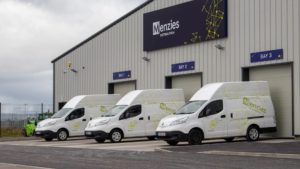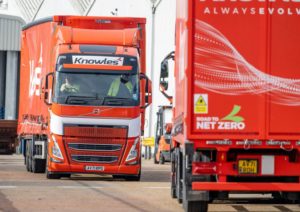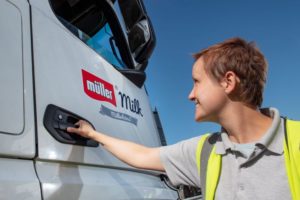
Encouraging progress is being made as organisations produce plans for net zero supply chains, invest in new technologies and carry out trials as they look to get a head start to benefit both their businesses and the environment.
For example, mail and parcels specialist Whistl, has produced a strategy to achieve net zero by 2045.
By calculating science-based emissions reduction targets, the company has taken a pragmatic approach broken down into two stages.
From a baseline of 2022, the short-term aim is a 21% emissions reduction by 2030 and by 2045 it expects to have reduced by 95% its annual carbon dioxide equivalent emissions to under 37,544 tonnes.
To meet its targets the firm aims to achieve a 100% zero and ultra low emission small van fleet by 2030 and a 100% zero and ultra low emission HGV fleet by 2040.
It also wants to achieve 100% procured renewable electricity across all its sites by the end of 2025 and reach zero operational waste to landfill by the end of 2025.
In addition, it is collaborating with its carriers and suppliers to obtain carbon data and set science-based net zero targets through a supplier engagement programme.
Finally, 80% of its employees will complete sustainability and net zero-related training by the end of 2024.
Nigel Polglass, Chief Operating Officer, Whistl said: “We believe in taking a science-based approach to this important issue, and particularly in the logistics sector, we depend on innovation and collaboration from our suppliers to enable us to reach this goal.
“We also look forward to developing new products and services for our customers to enable them to reach their own carbon reduction targets.”
Meanwhile, Menzies Distribution has announced plans to become net zero for Scope 1 and 2 emissions by no later than 2035 – 15 years ahead of the target date set under the Paris Agreement and in UK legislation.
In 2021 the business produced 90,459 tonnes of CO2e, with 90% coming from its vehicle fleet operations.
Menzies Distribution’s road to net zero is founded on validated scientific targets under the international Science Based Targets initiative (SBTi).
They will focus on a fleet strategy that delivers and evolves a decarbonisation strategy, minimising emissions through efficiency and optimisation, and maximising the use of clean fuels.
Menzies Distribution has a dedicated EV fleet for final mile deliveries and 100% of the power used across sites is from clean, renewable sources.
It also uses advanced telematics and route-planning to minimise fuel usage, plus innovation in vehicle and trailer design to improve aerodynamics, increasing fuel efficiency by 10-15%
There is also a fleet of longer semi-trailers (LST) that reduce road miles and the company is developing the ability to provide emission figures to support customers in tracking environmental impact.

Greg Michael, Chief Executive Officer of Menzies, said: “We recognise the scale of the challenge, particularly given the nature of our business, but we also know it is the right thing to do for our own future, as well as for our customers, our people and the country as a whole.
“Success will not only depend on our own actions, but also on the development of new technologies and a partnership between the private sector and government.
“While there will be significant hurdles to overcome, we are determined to play our part in building the sustainable supply chains of the future.”
Cambridgeshire-based Knowles Transport has identified several key objectives on the road to achieving its net zero goals.
It is actively utilising alternative fuels such as HVO, and 80% of Knowles’ warehouse material handling equipment is now powered by electric.
Moreover, Knowles recently completed a trial involving an electric Volvo XE 19 tonne rigid with a view to be used for local delivery or pallet network operations.
About 3% of the Knowles fleet is currently engaged in a vehicle roof deflector aerodynamics trial which improves airflow and reduces drag therefore increasing efficiency and minimising emissions generated.
In addition, the company aims to fully convert its company car fleet to electric vehicles by 2030.
Furthermore, across its two million sq ft of its warehousing portfolio, Knowles is currently producing 300,000 kWh of electricity per year representing 10% of total warehouse power usage, via solar energy and storage generation.
The firm has also enlisted supply chain logistics consultants Davies & Robson, provide a comprehensive analysis of its carbon footprint.
Results have provided a clear picture of all emissions across transport, handling and storage services and generate a unit of measurement for each that Knowles can use as a barometer to ensure it is becoming more sustainable while growing volumes across all service areas.
Alex Knowles, Managing Director at Knowles Transport, said: “These measurements are Kg CO2e per mile for transport, Kg C02e per pallet in for handling and Kg C02e per pallet week for storage.
“From the outset we were keen to not only better understand our current footprint but also to develop accurate emissions reporting each service area and to be able to offer every customer their own unique emissions data as they utilise our respective services which is becoming an increasing requirement for customers as they seek to understand their scope 3 emissions.”
Müller Milk & Ingredients is also trialling different technologies to reduce the carbon footprint of its HGV fleet and meet its goals, which include net zero in its own operations by 2035, and across its supply chain by 2050.
The dairy company, which operates its logistics in-house, has successfully trialled the delivery of fresh milk using refrigerated trailers that are battery and 100 per cent solar-powered.
Per trailer, the solar and battery-powered Sunswap system would eliminate all diesel, saving 3,700 litres and nine tonnes of carbon every year.
The business is also testing Carrier Transicold’s Vector eCool refrigerated trailer system, powered by kinetic energy, that would eliminate all carbon emissions associated with traditional refrigeration units operating with an auxiliary engine.
Müller has also trialled fully-electric shunt vehicles at its Manchester dairy and enhanced environmental driver training.
The trials aim to establish whether renewable energy solutions with a lower carbon footprint allow the business to maintain its quality and service levels, which sit above 99% in 2023.

“Our approach is to test, learn and introduce innovation which is sustainable and scalable.
“We are unique in that the vast majority of our logistics operations are in-house, giving us the ability to work with our customers, and throughout the supply, to find the right solutions.”








